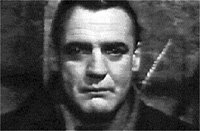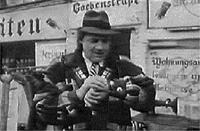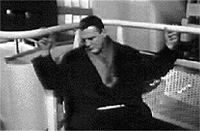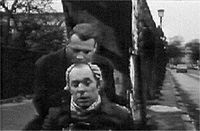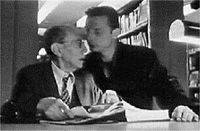|
Bruno Ganz, born in Zürich in 1941, played the leading role in Wings of Desire (1987): that of the angel Damiel, who chooses to become a human being. Bruno Ganz had previously starred in Wim Wenders's The American Friend (1977), and had other important roles in films made by such directors as Peter Handke, Werner Herzog, Giuseppe Bertolucci, Claude Goretta, Victor Schlöndorff and Alain Tanner. He would also reappear as the angel Damiel in the sequel to Wings of Desire, entitled Far Away So Near (1993). RR: Wenders described Wings of Desire as one of his B-films, which would mean that to some degree, the actors in the film are playing themselves... BG: But that's what they do in his films...
One of the main problems we had in making Wings of Desire was: how do you play an angel? Usually you play a character and then you think psychologically and you ask yourself, "What is this guy like? What is he feeling, and what is he thinking? How would he express himself, and is he angry? or hungry? or thirsty? or stupid?" Now this is a problem when you are playing an angel. What can you do? You can try to walk as though you could fly, and otherwise, you are yourself, because you can't do anything. You are just there. So he's right. Yes, you can describe that as being oneself. I mean there is just no acting. What you deliver is your physical presence. That's it. There's no possibility for psychological problems among angels. And that was really a kind of problem for us. We met quite often and we discussed the question of how to handle angels. We talked about Rilke, and Paul Klee, and images, and Wim had read a book - a Who's Who of angels, which was an Anglo-Saxon invention, it was amazing in that it showed a great sense of humor and knowledge about the history of the Church and how they treated their angels. Our problem was: how to express things? Picking up material on angels wasn't so hard. But what does it mean: you, you're an angel and what do you do? Do you fly or what? That was impossible. So you walk in the streets and you're invisible. You hear what people are thinking. But what does that mean? What do you do with your face, with your body? What do your eyes tell? What is an angel? RR: I imagine that an actor can be more or less attached to a particular role. And I was wondering whether the role of Damiel has special resonances for you, to a greater degree than other roles you have played. BG: It was quite touching… For example, here in England where the monarchy is very strong and very much alive, when actors play kings, they probably feel superior in relation to what they are normally. And kings are still human beings… But angels are something else. When filming Wings of Desire, it was almost a kind of miracle that happened. It was fabulous, walking around and hearing what people were thinking. Sure, we did it all ourselves and we were shooting a film. Still, I as an actor, as Bruno Ganz, I sometimes had the feeling that I was doing something extraordinary, and at certain moments even celestial. But what touched me the most deeply was that for several months after the film came out, when people - especially women - recognized me, in Berlin or elsewhere, their eyes opened wide and they said: "It's the guardian angel" …as though they actually took me for an angel. And people in planes said: "Ah, no need to be afraid, because with you here, nothing can happen. Now we are safe." Or a mother said to her child: "Look, there's your guardian angel." They weren't joking. Of course they knew we are real men and women, but somehow... It's strange. I don't know what really happened. That was an amazing feeling. I loved that. Because that means much more than people saying, "You are a very good actor," or "I love your work." If they say, "Oh, you are an angel," it's like a miracle. In some way I became an angel, and who except me has experienced that in his lifetime? RR: Do you have essentially the same relationship to Far Away So Near as you have to Wings of Desire? BG: No. I don't like remakes. And in Far Away So Near, I know I should not say this, but I think the script was really horrible. There's too much in it. All this arms traffic and weapons smuggling, this Russian mafia story, and then back to Hitler, Heinz Rühmann for 20 minutes, I didn't like that. No, I did the film because before we shot Wings of Desire, we had been talking about this pizza business in the second half but we had no time to use it. The first version of the script would have been a film of about seven hours, and so we had to cut it down. And the whole pizza business was removed from the script. So it was a part of the first script that we could transfer to the second film, which would be Otto's story, Far Away So Near. I liked the pizza business and my role, which is funny in the film, but I'm not really happy with the film as a whole. However I regret that Wim was treated very harshly at the Cannes Film Festival. I remember I had to fly back from Cannes to Salzburg very early the next morning, and I read the French and Italian newspapers, Libération and La Repubblica. "The highly estimated God-like cult figure, Wim Wenders," they just destroyed him. It was a journalists' movement and it was so easy to do because the film was weak. But he didn't deserve that. For example, the rhythm of the editing and the music are exceptionally good. Not many directors in Europe are capable of that. Even if I have reservations about other aspects of the film. RR: One of the funniest moments in Wings of Desire is when Damiel comes out of the antique store with his new clothes. Did you know ahead of time that that scene would be so funny? BG: No. We talked a lot about the "human clothing" but without deciding anything really specific. The costume designer had put some things together and brought them to Wim's office, and then we returned to the question of the new clothing after we shot the final scenes of Damiel as an angel and we did in fact manage to choose a new suit of clothes.
But one day, I brought in from home one of my own hats, and then I said: "Wim, listen. I think this would be funny." With that slightly weird checked jacket. He hesitated until the last moment, maybe five minutes before the scene was to be shot, and finally he decided to use the hat. For a very long time, he didn't want it. But I wanted it - the rather childlike and comical aspect, because after an hour and a half of black and white, with the seriousness of the angels and Peter Handke's monologues, we needed a change of style. And that's why I chose a slightly weird outfit. RR: Concerning gestures - for example, in shot 1079 where Damiel is seated in the library, with his hands on the railing, his eyes closed and his head slightly bowed. Was that gesture chosen by you or by Wim Wenders? BG: No that was me. Wim was concerned about that. He said it looked too much like some kind of "boxer," that it was excessive. And I thought it made a strong contrast with the library space that was so celestial. I found it interesting. I proposed it to him. He hesitated, then looked through the camera viewfinder, said "I don't know", then suddenly he said: "All right, I agree, I like it, we'll do it that way." But the gesture was my idea.
RR: I have heard about a scene that was included in the rough cut but was eliminated later: a scene in which Damiel et Cassiel throw cream pies at one another. [Bruno Ganz laughs.] It is hard for me to image how this scene could have been part of the film. BG: Yes, that's why Wim cut it out. In a way, it was logical for us. And it was fun to do. There is even a German expression: Die Tortenschlacht - the pie-throwing battle. It's a very well-known image, since German comedians, whenever they don't know what else to do, always end up throwing pies at one another. We filmed that, and I went to see the rushes, which I don't normally do. But I really wanted to see it, so I went to see the rushes and I found it very good - but at the same time knew that it represented a risk for the film. And Wim told me that he had kept that scene in the film for a very long time, but cut it out after the first rough cut. And he was right to do so, unquestionably. But it was really very funny. [Laughter.] RR. The dying man scene is one of the scenes I find most touching. Do you have any particular memories in connection with the shooting of that scene? BG: No. I remember really liking Peter Handke's lines, which wasn't always the case. I have a tremendous respect for him, because he is a personal friend and a great writer. But certain lines, such as the dialogue between Otto [Sander] and me in the BMW [shots 1049-1069] - no, that was all right! But later on, Marion's monologue didn't strike me as very good. But in the scene with the dying man, I liked the lines. I liked the shoot that day. And I recall that is was all really easy because everything worked. We arrived on the location, Wim knew what he wanted to do, everyone was ready and then we began, and very calmly and softly, slowly and with precision, we shot the scene and that was it.
RR: But you found other lines by Peter Handke too heavy, too serious? BG: No, I found that the lines written for Otto and me, since we were angels, could be quite poetic. But Marion was not an angel, she was a human being, and I didn't like her monologue. Too ambitious. RR: Concerning Marion's final monologue, certain commentators have discussed the fact that it is the woman and not the man who speaks at the moment of their first meeting. Someone used an expression I found very interesting: he said that the woman was in "the position of discursive authority" [2]… BG: Who said this? RR: A critic writing about the film said that it was interesting that in this situation, it is the woman who defines the agenda for the couple. BG: Well it might be that Wim and Handke were thinking in those terms. It is possible. But you know, Wim was in love with Solveig Dommartin [who played Marion] and he did everything he could to elevate her. That's the point. RR: I have noticed that Homer has a relation to Cassiel while Peter Falk and Marion are more connected to Damiel. BG: Marion by necessity, since the love story is about her and me… Otto is a comedian, while I am considered more a serious or tragic actor, for reasons that escape me. And Curt Bois [who plays Homer] is like Otto.
Otto and I did a film together [Gedächtnis, 1983] about two actors, because we were afraid they would soon die - Bois is now deceased - and the other [Minetti] was just as old. He must be 90 or 91 today and is still working. Bois was Jewish, the other German. Bois had to leave the country. He went to the Unites States, where he made films in which he could be seen for thirty seconds. He was very famous, a big star in Germany. And the other actor had a very big career during the Nazi era. That interested us. So Otto and I made a documentary film about those two actors. And even then, Otto constantly spoke to Bois and I to Minetti. Bois and Otto saw themselves as belonging to the same family. And I am apparently part of the other family. I don't really know why. And also that's the way Wim wanted it. […] RR: You have worked with a number of directors. I imagine that working with Wim Wenders isn't quite the same as working with the others. He must have his own way of working, and I know that with Wings of Desire, for example, there was no final script... BG: Well, even with The American Friend, we didn't really have a script. And sometimes - more than sometimes - it was in the evening, after shooting, that we worked out the dialogue for the next day. And sometimes it was in English, other times in German... The way Wim works is far away from industrial film. He invents the film while shooting... which costs a lot of money, a lot of material. He takes risks. But he is his own producer so he can afford it, maybe. But I think he had to sell his father's house when we did The American Friend. And he's been a gambler. There is a "poker player" side to him. You wouldn't think so, because he has always given the impression of being a fragile artist, but there is a hard side to him as well. And he takes enormous risks with respect to financing. In making films, as you mentioned, with other directors, my respect for Wim Wenders increases constantly because it is a matter of creating something together. And here [in London, with the BBC], there is a storyboard, there is a studio, and the work is executed. You execute a film. It's terrible, it's a terrible way to work... It's industrial filmmaking. I don't like that. And Wim is really different. He invents a film while shooting. That's amazing. Nobody else does that. RR: I was wondering whether the circus in Wings of Desire might be a kind of metaphor for the shooting of a film. BG: Yes, possibly. But you really have to talk to Wim about that. I'm not sure. I thought more in terms of Fellini… Sure, I understand that Marion has to come from somewhere. And since she is a trapeze artist, all right, it's the circus. That's obvious. But I didn't specially like the whole circus side of the film… And I don't know to what extent Wim wanted to go with that metaphorical meaning in the film. I didn't talk to him about it. RR: I asked him if the circus was to some degree a metaphor for filmmaking, or was I way off. And he said, "No, you're not way off at all." I thought of it just now because you mentioned the financial risks Wim Wenders takes, and the circus is shut down when they run out of money... BG: Yes, maybe. But the circus scenes were too sentimental. I didn't like that. But as a metaphor for shooting a film… RR: Especially since he named the circus "Alekan". Or do you see another explanation? BG: No, I very much like Henri Alekan just as Wim does. The way he chose all his favorite directors to play the mafia in The American Friend. And he made a film on the death of Nicholas Ray, Lightening over Water. This whole aspect: "Dedicated to..." That's something I really like a lot about Wenders. […] RR: One final question. I read about your reaction when you saw the rough cut of Wings of Desire, in an interview you gave before the film came out. When you saw the final version of the film for the first time, were you surprised? And do you recall your initial reaction? BG: No, no surprises. The only surprise was that I was happy with [my acting in] it. I thought: that's good work, not bad at all. Because often, when you see a film you have just shot, you say to yourself: "Oh, what was I doing there? It can't be. And everyone is going to see that. Oh, what a mess!" No in that case, I was rather relieved. I watched it and thought to myself: it's not bad, it's OK. London, 16 October 1994 [1] During this interview, Bruno Ganz replied to some of my questions in English and to others in French. When the interview appeared in (Pré)-publications 146 (December 1994), pp. 24-31, portions of it were in French. Here I have translated the French passages into English and added illustrations.
[2] In "Angels, Fiction and History in Berlin: Wim Wenders' Wings of Desire," The Germanic Review 66, 1 (Winter 1991), p. 46, Roger Cook cites a passsage from Kaja Silverman's "Disembodying the Female Voice," in which she wrote: "[In classical cinema], the female subject [...] is excluded from positions of discursive authority."
|
